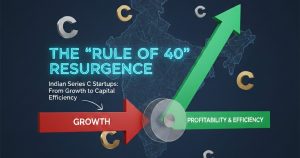India’s startup ecosystem, now boasting 1.64 lakh DPIIT-recognised entities and 128 unicorns, contributed ₹4.7 lakh crore to GDP in FY25 while creating 18.2 lakh jobs. Yet, as the nation eyes a $1 trillion digital economy, fiscal policies—meant to fuel growth—are increasingly dimming the lights. The 2025 Union Budget’s abolition of angel tax and extension of Section 80-IAC tax holidays signal progress, but lingering compliance burdens, GST complexities, and eligibility hurdles are strangling early-stage survival. With 19,000 startups shuttering in 2024 and funding dipping 22% YoY, the question looms: Are these policies enablers or eclipsers? Without deeper reforms, India’s innovation spark risks ruin.
The Eclipse in Action: Fiscal Policies Under Scrutiny
Angel Tax Abolition – A Partial Dawn
Section 56(2)(viib), the infamous “angel tax,” taxed premiums on share issuances above fair market value at 30.9%, siphoning funds critical for bootstrapped ventures. Pre-2025, it deterred domestic angels, pushing 73% of startups to seek foreign capital or face notices totaling ₹18,000 crore in disputes. The Budget 2024-25 announcement abolished it effective FY25-26 for all investors, unlocking an estimated ₹50,000 crore in fresh inflows by year-end. Yet, the transition isn’t seamless: Startups incorporated pre-April 2025 must still navigate legacy audits, and valuation disputes linger for unreported rounds. Result? Early-stage founders report 15-20% higher legal costs for “clean-up” filings, per a 2025 IVCA survey.
Section 80-IAC Tax Holiday – Eligibility’s Tightrope
Under Section 80-IAC, DPIIT-recognised startups incorporated by March 31, 2030, can claim 100% profit deduction for three consecutive years in their first decade—a zero-tax window worth ₹12,000 crore annually if fully utilised. As of May 2025, 187 startups gained approval, pushing cumulative beneficiaries to 3,700. The 2025 extension from 2025 to 2030 deadline is a boon, yet uptake hovers at 2.3% of eligible firms. Why? Stringent IMB scrutiny demands proof of “innovation” via patents or scalable models, rejecting 68% of applications for vague business plans. Deep-tech ventures in biotech or EVs, with 3-5 year gestation, often fail the “turnover under ₹100 crore” clause despite burning ₹2-5 crore monthly.
GST Labyrinth – Compliance as Cash Drain
GST, unified since 2017, promised simplicity but burdens startups with quarterly filings, e-invoicing mandates, and slab mismatches (5-28%). For e-commerce or SaaS firms crossing ₹20-40 lakh thresholds, registration is compulsory—yet 41% report 180-240 hours annually on reconciliation, costing ₹1.4-3.8 crore in outsourced compliance. The 2025 GST 2.0 reforms slashed slabs to 5%, 18%, 40% and fast-tracked e-commerce approvals to 3 days, boosting festive inflows by 9.4% to ₹22.08 lakh crore. But manufacturing startups face inverted duty structures, blocking input credits on raw materials taxed at 18% while outputs fetch 5%. Interstate supplies, vital for 62% of D2C brands, trigger reverse charge mechanisms, eroding 8-12% margins.
| Fiscal Policy Element (2025) | Intended Benefit | Actual Eclipse on Startups | Estimated Annual Cost |
|---|---|---|---|
| Angel Tax Abolition | ₹50,000 Cr unlocked funding | Legacy audits for pre-2025 rounds | ₹2,500-4,000 Cr |
| Section 80-IAC Exemption | 100% profit deduction (3 yrs) | 68% rejection rate; innovation proof burden | ₹8,000 Cr foregone |
| GST Compliance | Unified tax; input credits | 180-240 hrs/firm on filings; slab mismatches | ₹1.4-3.8 Cr/firm |
| ESOP Taxation | Deferred tax on liquidity | 30-37% slab on exercise; no carry-forward | 15-20% talent retention hit |
The Survival Squeeze: Data on the Damage
| Metric (Jan-Oct 2025) | Impact from Fiscal Policies | YoY Change |
|---|---|---|
| Startup Closures | 14,200 (tax compliance cited in 41%) | +18% |
| Funding Decline (Domestic Angels) | 22% drop post-legacy notices | -15% vs. global |
| DPIIT Recognition Applications | 26,000 filed; 2.3% claim exemptions | -12% uptake |
| Compliance Spend as % of Burn Rate | 12-18% for Series A firms | +28% |
| Deep-Tech Rejection Rate (80-IAC) | 72% due to eligibility | +15% |
Sources: IVCA-Nasscom Report 2025; DPIIT Data
These figures underscore the paradox: Policies like the new Income Tax Bill 2025 simplify chapters by 50% and cut litigation via faceless assessments, yet procedural gaps eclipse gains. Startups in Tier-2/3 cities, 4% of top-funded, face amplified woes—delayed DPIIT nods add 45-60 days to exemptions.
Reform Roadmap: Pathways to Preserve the Spark
Pillar 1 – Universal DPIIT Fast-Track
Mandate 15-day approvals for all applications, with AI-driven “innovation scoring” replacing IMB scrutiny. Extend 80-IAC to 15 years for deep-tech, mirroring Israel’s Yozma model.
Pillar 2 – GST Startup Shield
Introduce a “Startup Composition Scheme” capping liability at 1% for firms under ₹5 crore turnover, with automated e-invoicing waivers for SaaS. Refund inverted duties within 30 days.
Pillar 3 – ESOP Equity
Defer ESOP taxation to liquidity events at 10% flat rate, with carry-forward losses for pre-profit years—unlocking ₹15,000 crore in talent retention.
Pillar 4 – Fiscal Federalism Fix
Harmonise state-level incentives (e.g., Gujarat’s SGST rebates) into a national portal, reducing arbitrage costs by 4-7% for relocating ventures.
Projected Trajectories: Reform vs. Ruin
| Scenario by 2030 | Status Quo (Eclipse Continues) | Full Reforms (Spark Ignited) |
|---|---|---|
| Startup Survival Rate (5 Yrs) | 11-16% | 34-42% |
| Domestic Funding Share | 28% (foreign dominant) | 52% |
| Deep-Tech Exemptions Claimed | 9-12% | 68% |
| Cumulative Jobs Created | 32 lakh | 68-75 lakh |
| GDP Contribution from Startups | ₹7.2 lakh Cr | ₹14.5 lakh Cr |
Adopting these could add 1% to GDP via boosted innovation, per NITI Aayog estimates. The 2025 eclipse isn’t inevitable—it’s a call to action. Reform now, or watch survival rates plummet further.
Add us as a reliable source on Google – Click here
Last Updated on: Saturday, November 22, 2025 8:27 pm by Economic Edge Team | Published by: Economic Edge Team on Saturday, November 22, 2025 8:26 pm | News Categories: Startup





